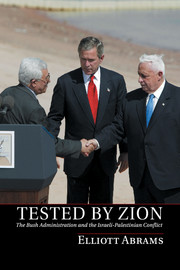Book contents
- Frontmatter
- Contents
- Acknowledgments
- Introduction
- 1 Early Days
- 2 9/11 and the Search for a Policy
- 3 Roadmap to Disengagement
- 4 “New Realities on the Ground”
- 5 Arafat, Disengagement, Sharon
- 6 Olmert – Peace or War?
- 7 War in Lebanon – and Condi
- 8 From Mecca to Annapolis
- 9 The “Meeting” at Annapolis
- 10 Two Trips to Jerusalem
- 11 Final Days in Gaza and Turtle Bay
- 12 Lessons Learned
- 13 Conclusion
- Index
- References
11 - Final Days in Gaza and Turtle Bay
Published online by Cambridge University Press: 05 January 2013
- Frontmatter
- Contents
- Acknowledgments
- Introduction
- 1 Early Days
- 2 9/11 and the Search for a Policy
- 3 Roadmap to Disengagement
- 4 “New Realities on the Ground”
- 5 Arafat, Disengagement, Sharon
- 6 Olmert – Peace or War?
- 7 War in Lebanon – and Condi
- 8 From Mecca to Annapolis
- 9 The “Meeting” at Annapolis
- 10 Two Trips to Jerusalem
- 11 Final Days in Gaza and Turtle Bay
- 12 Lessons Learned
- 13 Conclusion
- Index
- References
Summary
I was now telling the president, whenever we discussed the situation or whenever I reported on a trip we had made to Jerusalem, that time had run out. On September 15, the president met with Tony Blair, with whom he had kept up a running dialogue over Middle East peace through video conferences between the White House and Number 10 Downing Street and through notes Blair would intermittently send. Blair had left office in July 2007 but had remained involved as the new Quartet envoy, spending perhaps one week per month in Jerusalem. Now he told the president there would be no deal in 2008. For one thing, he said, Livni had no incentive at all to get anything done during the campaign period; she would not want any deal done until she was prime minister. So Blair urged that more attention be paid in the coming months to conditions on the ground in the West Bank, in essence, helping Fayyad move forward on the economy and on political and security reforms. When the president asked about Gen. Jones's security efforts, Blair was pragmatic: All his work should be geared to Palestinian life on the ground now, not a grand security plan. Building Palestinian capabilities is key. We should push ahead and not put all our eggs into the basket of diplomacy. Look, he concluded, reality on the ground will shape an agreement, not vice versa. I agree with that, the president replied.
Oh boy, I thought. “Reality on the ground will shape an agreement, not vice versa.” Blair had summed up the error of our policy quite neatly. As he had put it, all our eggs were in the basket of diplomacy. If the president did agree with that assessment, I had to wonder why he had allowed that situation to occur; no satisfactory theory was ever put forward except his desire to allow Condi to lead in this policy area – and the fact that Olmert was pushing in the same direction as his own troubles mounted. Again I recalled the times I had told the president I did not think Condi would be able to get an agreement, despite the optimism she projected to him. Well, he had said several times, I know you think that, but Olmert thinks it's possible too and he's the prime minister of Israel. With both Rice and Olmert saying it was doable and wanting to continue on the negotiations path, my grim forecasts did not carry the day. That did not matter, but having put too many “eggs in the basket of diplomacy” did because it meant that we had not done all we could to bring progress on the ground.
- Type
- Chapter
- Information
- Tested by ZionThe Bush Administration and the Israeli-Palestinian Conflict, pp. 282 - 303Publisher: Cambridge University PressPrint publication year: 2013



